There's loads of things to worry about if you are a bear such as valuations, China, US yield curve flattening, economic woes in Europe, the recent collapse in freight rates etc. Here is an apt summary of these views from the pro's:
Things to Worry About as a Bear About
Ahead of the Curve provides analysis and insight into today's global financial markets. The latest news and views from global stock, bond, commodity, and FOREX markets are discussed. Rajveer Rawlin is a PhD and received his MBA in finance from the Cardiff Metropolitan University, Wales, UK. He is an avid market watcher, having followed capital markets in the US and India since 1993. His research interests include capital markets, banking, investment analysis, and portfolio management, and he has over 20 years of experience in the above areas, covering the US and Indian markets. He has several publications in the above areas. He currently teaches business and management students at CHRIST University. The views expressed here are his own and should not be construed as advice to buy or sell securities.
Featured post
Time Series Analysis with GRETL
This video shows key time-series analyses techniques such as ARIMA, Granger Causality, Co-integration, and VECM performed via GRETL. Key dia...

Showing posts with label valuation. Show all posts
Showing posts with label valuation. Show all posts
Wednesday, 20 February 2019
Things to Worry as a Bear
I have been tracking capital markets across the globe since 1993, I write about financial markets and teach business and management students financial markets and investing at CHRIST University.
Wednesday, 4 October 2017
Emerging Parallels to the Fall of 2007 - Hallmark of a Brand New Crisis
The fall of 2017 is increasingly looking like the fall of 2007 when risky assets topped out:
Labels:
commodities,
dollar,
margin debt,
qe,
qt,
recession,
stock market crash,
valuation,
volatility,
yen
I have been tracking capital markets across the globe since 1993, I write about financial markets and teach business and management students financial markets and investing at CHRIST University.
Wednesday, 23 November 2016
Chart of the Week - Combined Valuation of Equities and Bonds
The chart of the Week is courtesy Seventeen Mile via Seeking Alpha and shows the combined value of stocks and bonds since 2003. Thanks to the FED engineered asset bubble the combined valuation is testing all time highs made in 2015 prior to a 15% sell off in the S and P 500. Recently bonds have endured a significant and sharp sell off. Equities are likely to follow suit.
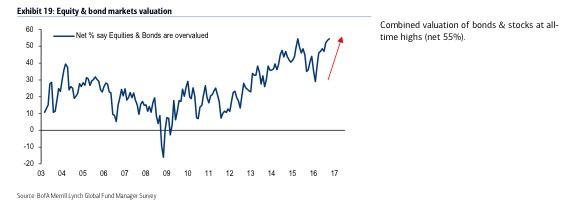

Labels:
asset bubble,
bonds,
fed,
stock market correction,
stocks,
valuation
I have been tracking capital markets across the globe since 1993, I write about financial markets and teach business and management students financial markets and investing at CHRIST University.
Tuesday, 7 June 2016
Chart of the Day - Growth in the S & P 500, P/E Ratio, Earnings
The chart of the day is courtesy the SRSrocco report and is a comparison of the increase in the S and P 500 and its P/E ratio since 2011 relative to its change in earnings. A pretty big divergence is seen with earnings growth lagging far behind. Either the earnings growth has to catch up or prices have to come down in line with the sub par earnings growth observed.
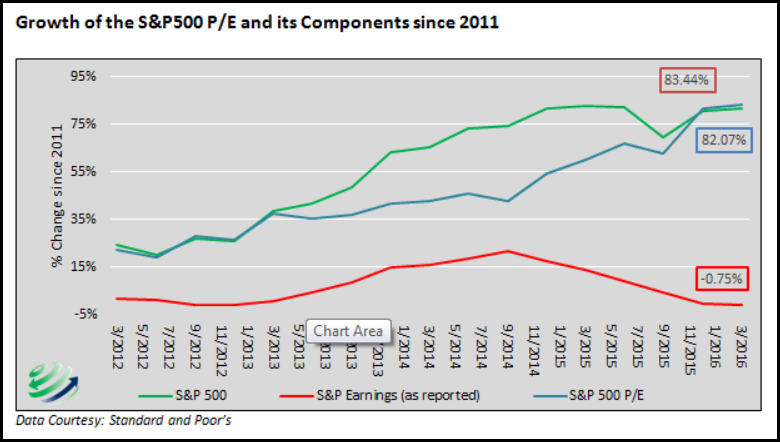

Thursday, 10 September 2015
Interesting Charts from the World of Economics and Financial Markets-2
The first two charts are from John Rubino at dollarcollapse.com that shows that the Japanese economy hasn't recovered despite the record stimulus from the Bank of Japan:
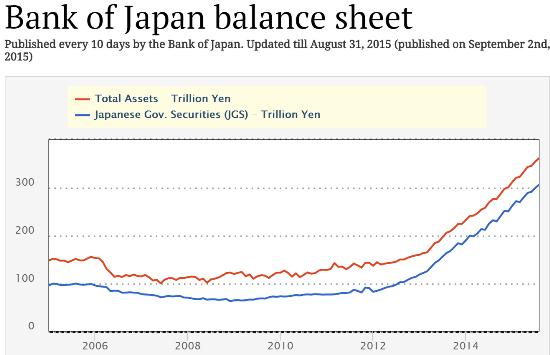
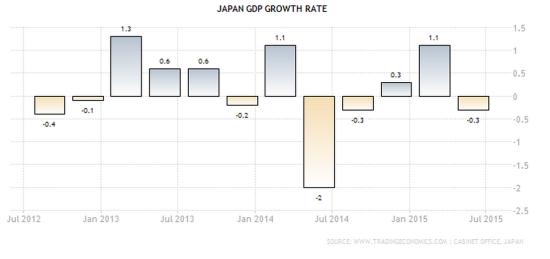
2) The next chart is from Ashraf Laidi who compares the Dollar's performance during past Fed tightening cycles and suggests the #Dollar may have peaked already:
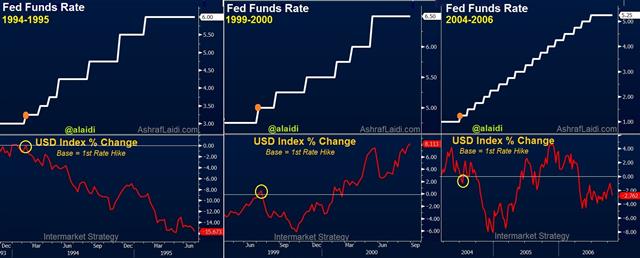
3) The last chart is from John Hampson at solarcycles.net that shows that the #SandP500 is in significantly over valued territory:
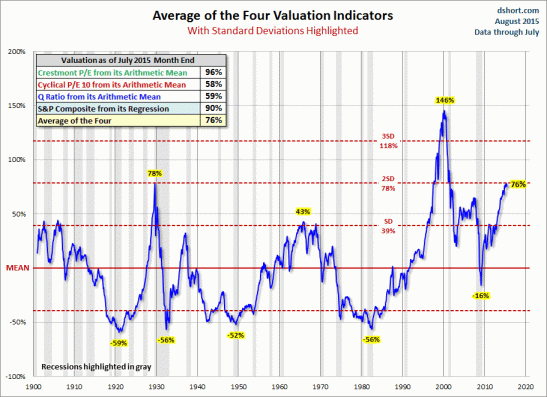


2) The next chart is from Ashraf Laidi who compares the Dollar's performance during past Fed tightening cycles and suggests the #Dollar may have peaked already:

3) The last chart is from John Hampson at solarcycles.net that shows that the #SandP500 is in significantly over valued territory:

You can see some more interesting charts here.
Interesting Charts from the world of economics and financial markets
http://t.co/UjJMixfRRt pic.twitter.com/uf46iJ5wfy
— samuelR (@RajveerRawlin) September 10, 2015
I have been tracking capital markets across the globe since 1993, I write about financial markets and teach business and management students financial markets and investing at CHRIST University.
Subscribe to:
Comments (Atom)
World Indices
Live World Indices are powered by Investing.com
Market Insight
-
-
All Eyes on the Fed: Rate Cut This Wednesday? - Will they or won’t they? On Wednesday, the Fed will decide whether to keep rates steady or to cut them. And from the looks of things, Mr. Market consider...2 hours ago
-
S&P 500 and Bitcoin Up Into Hurst 40-Day Cycle Peak | Christopher Grafton - General Outlook: US Dollar Up (80D trough). Gold Small Down (->20D trough). Oil Down (40D peak). Copper Small Up (->80D peak). USDJPY Up (80D trough). EURU...3 hours ago
-
SMX (Security Matters) Stock Is Trending: What's Going On? - Shares of SMX (Security Matters) PLC (NASDAQ: SMX) are crashing Monday, trading down roughly 50%. Here's what you need to know. read more3 hours ago
-
Boeing Is Poised to Close on Spirit Aero. Is It Still a Buy? - Boeing (BA) has endured a brutal stretch of turbulence over the past five years, with a cascade of operational blunders eroding investor trust and slashi...5 hours ago
-
Adviser links: financial well-being - Mondays are all about financial adviser-related links here at Abnormal Returns. You can check out last week’s links including a look at...6 hours ago
-
Manufacturing employment and productivity - What’s really happening in US manufacturing? In our FRED graph above, we compare labor productivity for all workers in the manufacturing sector alongside t...6 hours ago
-
Daily Market Brief - Subscriber content. To subscribe to the Daily Market Brief please visit Market Services on NorthmanTrader.com. The Daily Market Brief is an in-depth market...9 hours ago
-
10 Monday AM Reads - My back-to-work morning train WFH reads: • Trump’s Tariffs Could Be Overturned. Companies Are Rushing to Get Refunds. Dozens of importers, including majo...9 hours ago
-
Italy Declares Central Bank Held Gold an Asset of the People - European Central Bank President Christine Lagarde steps in every time a government attempts to implement monetary policy. The centralized power now has the...15 hours ago
-
11 Signs That Our World Is Rapidly Becoming A Lot More Orwellian - All over the globe, the digital control grid that we are all living in just continues to get even tighter. They are using facial recognition technology t...23 hours ago
-
Holding Firm - Weekly report covering Gold, Equities, Crude, Dollar. A look at trade opportunities and covering the model portfolio. The post Holding Firm appeared firs...2 days ago
-
S&P 500 PE Ratio - *Current S&P 500 PE Ratio:* 31.06 +0.06 (0.20%) 4:00 PM EST, Fri Dec 52 days ago
-
Greed, Centralization, Monopoly, Ruin - *Greed is good up to the point that it delivers ruin. * *The primary characteristic of this era is the purposeful confusion of profit and greed, as if the...3 days ago
-
Decennial Pattern - [image: decennial pattern] Years ending in 5 are up years almost without exception through the entire history of the DJIA. The two exceptions were 2005,...3 days ago
-
State of Crypto Now: How Stablecoins, Institutions & AI Are Driving Web3’s Next Chapter - Over the past few years, a mix of technological innovation and favorable regulatory changes has ushered in a new era for cryptocurrencies and the blockchain3 days ago
-
Trillion Dollar Market Caps: Fairy Tale Pricing or Business Marvels? - Stock markets have always rewarded winners with large capitalizations, and with each new threshold, the questions begin anew of whether animal spiri...5 days ago
-
Debt Rattle November 29 2025 - Rene Magritte Memory 1948 In mid-October, I had a ‘cerebral infarction’. Spent some time in hospital, then in a revalidation center. Now, I intend to rev...1 week ago
-
Black Friday Deal - 1 Year Membership for $600 ($700 regular price) Coupon code STOCKBEE3 Months for $339 ($389 regular price) Coupon code TRIAL502 weeks ago
-
THANKSGIVING DAY IN THE US - The US will celebrate Thanksgiving Holiday on Thursday, November 27th. For special market closures on Thursday and Friday please check the *Trading Break...2 weeks ago
-
Our Stock Pick Of The Month For November 2025 Is Pasofino Gold (TSX.V:VEIN) – David Skarica - Pasofino Gold: TSX.V:VEIN Our stock pick of the month for November 2025 is Pasofino Gold With gold prices skyrocketing to nearly $4,000 an ounce it is t...3 weeks ago
-
The 2025 Job Market For The Auto Industry - The uncertain question of today is whether it's a Buyer's Market leaning towards employers or a Seller's Market giving employees the upper-hand during job ...4 weeks ago
-
Ascent Group LLC Sells 3,494 Shares of iShares MSCI Emerging Markets ETF $EEM - Ascent Group LLC lessened its stake in shares of iShares MSCI Emerging Markets ETF (NYSEARCA:EEM – Free Report) by 23.4% during the second quarter, accordi...2 months ago
-
Bitcoin’s 200-Day MA Breakout: Trading Crypto in Uncertain Times - As Bitcoin breaks through critical resistance levels, seasoned traders are eyeing both opportunities and warning signs in today’s volatile crypto landsca...7 months ago
-
EV Supply Chain Play: Why Solid Power (SLDP) Could Be a Hidden Gem in Battery Tech - The electric vehicle (EV) revolution is shifting into high gear, and battery technology is at the center of it all. While traditional lithium-ion batteries...9 months ago
-
Climate Change Profiteers Reveal The Democrat Party As A Satanic Death Cult Of Morons - By Barry Ferguson12/10/24The Democrat Party in the US has devolved into a satanic death cult of morons. They not only want to destroy themselves but the re...11 months ago
-
Hello world! - Welcome to WordPress. This is your first post. Edit or delete it, then start writing!1 year ago
-
Weekend Update - Trendline rejection (3/8/24) - SPX was rejected by the blue trendline Friday. The trendline had been sucessfully tested four times and held since November, until now. SPX has unable ...1 year ago
-
Mungerisms: Timeless Wisdom from Charlie Munger on Life and Business - "Mungerisms" are succinct expressions of wisdom and insights coined by Charlie Munger, the Vice Chairman of Berkshire Hathaway and Warren Buffett's longtim...2 years ago
-
It’s Crunch Time for The Daily Doom and Doom Time for The Great Recession Blog - The Great Recession Blog is officially done for good, and my writing continues on TheDailyDoom.com. This site will eventually be completely terminated. If ...2 years ago
-
Innovative Industrial Properties Stock a Great Way to Play Pot Sector - *IIPR Stock Represents a Long-Term Opportunity* Marijuana stocks briefly attracted investors' attention following the 2022 mid-term elections, when Maryl...2 years ago
-
2008 analogue - The 2008 analogue tape looks very interesting from where we stand. Let's anchor it to the next two Fed meetings -- since that's all that matters -- and i...2 years ago
-
Back to trade with Bar Replay - It is often said that one should not be sad about the past, but sometimes it can be nice to return to it. Who would like to buy Tesla for $1 and experience...2 years ago
-
After This Holiday Rally, You Better Know When To Walk Away - This week’s investor insight will make you think twice about the current stock and bond rally as we head into the end of the year. We get a lot of questi...3 years ago
-
How Africa Can Escape Chronic Food Insecurity Amid Climate Change - The toll of extreme weather events on crops underscores the region’s challenges and need for policies to save lives and protect livelihoods.3 years ago
-
12 Bear Market Rules To Live By – Survive & Thrive In The Next Bear Market - 12 Bear Market Rules To Live By – Survive & Thrive In The Next Bear Market [image: Bear Market Rules Survival Guide] I grew up in the 1970s-1980s when th...3 years ago
-
Growth Companies – Getting What You Want - What do the growth companies in your field have in common? How are they doing so well and what can you learn from them? Growth companies usually make a pro...3 years ago
-
-
Blog Post Title - What goes into a blog post? Helpful, industry-specific content that: 1) gives readers a useful takeaway, and 2) shows you’re an industry expert. Use your c...4 years ago
-
Foot Locker Crushed Q2 Earnings Expectations Sending Stock Higher - Plus, AstraZeneca said its antibody therapy reduced the risk of developing COVID-19 symptoms by 77%, The Topps Co’s SPAC merger is off, and Elon Musk annou...4 years ago
-
Elliott Wave Stock Market Update - July 10th - The market has continued its rally to higher highs and it doesn't seem like it wants to stop. We now have a new ATH at 4371 which are NASDAQ levels s...4 years ago
-
The Psychology of QE is Far More Important Than the Amount of It - Let's discuss what QE really does vs the psychology of QE.4 years ago
-
Hello world! - Welcome to WordPress. This is your first post. Edit or delete it, then start writing!4 years ago
-
Market Signals for the US stock market S and P 500 Index and Indian Stock Market Nifty Index for the Week beginning November 09 - Indicator Weekly Level / Change Implication for S & P 500 Implication for Nifty* S & P 500 3509, 7.32% Bullish Bullish Nifty 12264, 5.34% Neutral ** Bullis...5 years ago
-
Fully Automated Trend Trading w/ Stocks Or Options - There’s a lot of research to support the usage of trend indicators as simple risk reduction elements that can be layered onto an existing strategy. Howev...5 years ago
-
2020 Top Investment Picks – Q3 Update - At the beginning of the year, I put together a list of Top Investment Picks for 2020 from the investment community and track them on this website. This is ...5 years ago
-
The last of 12326 - February 22nd 2012..... First post... https://permabeardoomster.blogspot.com/2012/02/can-anyone-fly-plane.html -- This post will be the last under the o...5 years ago
-
-
Ultramarathoner Runs Over 200 Miles in Backyard, Wins Golden Toilet Paper Roll - Strange times indeed. In the land “BC,” before coronavirus, people ran long distances in foot races, and toilet paper wasn’t coveted. Things have changed. ...5 years ago
-
March report "How Revolutions, Wars and Plagues are Harbingers of 'Great Changes' in Societies and in Economics" published. http://bit.ly/2y4LJZQ - March report "How Revolutions, Wars and Plagues are Harbingers of 'Great Changes' in Societies and in Economics" published.https://t.co/k29bzcK3DY — Marc ...5 years ago
-
Weekend Report - Weekend Report Provided by the OEW Group December 21, 2019 Last Monday started with a sharp rally on positive trade news. After closing at 3169 the previou...5 years ago
-
Financial Markets Will Move To Asia - Chicago, they invented the Soybean futures contracts. But now, China uses more soybeans than ... *READ THE REST OF THE ARTICLE ON THE NEW WEBSITE: JIM ROGE...5 years ago
-
GW Pharmaceuticals (GWPH) Signals Bearish Continuation To $100 -
GW Pharmaceuticals $GWPH has been retreating sharply, and might have further downside towards $100.
G...
6 years ago -
Meet Hert Capital and How He Uses Stocktwits - On Stocktwits, HertCapital has been known for quite some time. But for those reading who haven’t had a chance to follow him, we asked him a few questions...6 years ago
-
The Earnings Mirage: Why Corporate Profits are Overstated and What it Means for Investors - I just published a new long-form piece through OSAM Research Partners entitled “The Earnings Mirage: Why Corporate Profits are Overstated and What it Means...6 years ago
-
Nightly Algo Report – December 6, 2018 - To access this post, you must purchase Premium Plan or Premium Plan - Annual. The post Nightly Algo Report – December 6, 2018 appeared first on Elliottwa...7 years ago
-
Don’t be Fooled by the Pullback in the Dollar Because…. - Don’t be fooled by the pullback in the U.S. dollar today because the greenback could still strengthen further before the end of the year. Nearly all of the...7 years ago
-
Weekly Videos - This week’s video will be posted on the new home for Short Takes. If all goes well, it will appear sometime between 6:00 and 8:00 pm ET.7 years ago
-
Gold’s silent comeback and the middle class rebound - The middle class has been stuck in a rut – psychologically if not economically – for years, and they’re not afraid to admit it. Last year’s upset victory...8 years ago
-
Kafka For The Twenty First Century - I've been spending a slightly frustrating day trying to update my payment details at google. To log in to my admin console I need to log in using my G Sui...8 years ago
-
The Progressive Case for Abolishing the Corporate Income Tax - Reform of the corporate income tax is shaping up to be one of the big issues facing Congress in 2017. Republicans are pushing for big cuts in the corpora...8 years ago
-
Gold Unleashed by Fed - Gold's next major upleg was likely unleashed by a very-dovish FOMC this week, which now has its hands tied on hiking rates or being hawkish due to the US e...9 years ago
-
From false moves… - One of my favorite sayings came from my trader friend Brian Shannon, who said from false moves come fast moves. I always pay attention to […] The post Fr...12 years ago
-
Why Mitt Romney Will Be The Next President - News Flash: Despite how it may look, what with Occupy Wall Street protests and Tea Party rallies, the country’s populous is not as polarized as it might se...13 years ago
-
August 24th Blogger Sentiment Poll - There are more bulls than bears in this week's poll. Blogger Sentiment Poll Participants: 24/7 Wall St (N) Carl Futia (+) Dash of Insight (+) Elliot Wave L...16 years ago
My Favorite Books
- The Intelligent Investor
- Liars Poker
- One up on Wall Street
- Beating the Street
- Remniscience of a stock operator
Trading Ideas
Forex Insight
-
Forex Today: US Dollar steady ahead of the Fed decision, US employment data - Read more on https://www.fxstreet.com1 hour ago
-
Premium Watchlist Recap: Australia GDP Report (Q3 2025) - Australia’s Q3 GDP miss sparked initial Aussie weakness before rapid recovery as traders focused on hawkish RBA policy repricing, demonstrating how centr...2 hours ago
-
FOMC Meeting Preview: How the FOMC's December Dot Plot Will Affect the US Dollar (DXY) - Previewing the highly unpredictable December 10, 2025 FOMC meeting. The Fed is "flying blind" due to a data void, facing a conflict between recession fears...2 hours ago
-
Upward Revision to Q2 GDP Aids the US Dollar’s Feeble Recovery - The second estimate of US GDP growth in Q2 saw an upward revision from 2.8% to 3%. However, US resilience has come under pressure, particularly in the labo...1 year ago
-
Don’t be Fooled by the Pullback in the Dollar Because…. - Don’t be fooled by the pullback in the U.S. dollar today because the greenback could still strengthen further before the end of the year. Nearly all of the...7 years ago
-
EUR/USD Weekly Outlook - EUR/USD's decline attempt was contained at 1.0494, above 1.0493 support and rebounded. Initial bias stays neutral this week first. On the upside, break of ...8 years ago
-
Loonie and Aussie Share Downward Bond - In yesterday’s post (Tide is Turning for the Aussie), I explained how a prevailing sense of uncertainty in the markets has manifested itself in the form of...14 years ago
Economic Calendar
India Market Insight
-
US Fed Policy and Mercury Sign Change: Weekly Forecast for SENSEX - Disclaimer This analysis represents the highest-probability forecast derived from expert, multi-decade historical evaluation of astrological signatures a...15 hours ago
-
Reduce Persistent Systems; target of Rs 3700: Emkay Global Financial - [image: Reduce Persistent Systems; target of Rs 3700: Emkay Global Financial] Emkay Global Financial recommended reduce rating on Persistent Systems with a...1 year ago
-
Rupee falls 29 paise to close at 82.68 against US dollar - During the day, the rupee touched a high of 82.45 and a low of 82.68 against the greenback. On Friday, the rupee had settled at 82.39 against the dollar.2 years ago
-
-
JUST NIFTY BLOG 10-01-2020 - Bulk Deals FII DII Stats Date # of Deals Total Volume (In Millions) 01-01-1970 0 0.00 Click here to see all Bulk Deals Date Category Buy Amount (Rs. Cror...5 years ago
-
Gold Top down analysis. - - Updating blog after a long Gap. Longest in the last 8 years. May not be able to update regularly for 2 more months to come. - Gold bulls co...7 years ago
-
Vist Note on Federal Bank - We recently met the senior management of Federal Bank which is one of the old private sector banks with a distribution network of 1252 branches (48% Kerala...7 years ago
-
Bank Nifty does Price Time Squaring and gave big move - As discussed in Last Analysis Bank Nifty gave the big move as we were expecting near turn date and also made low of 24706 near our target of 24700 and bo...8 years ago
-
Midcap & Smallcap Index Corrects, Lets Come Back To Fundamentals Again - Midcap Index had made a high of 18511 on 16th May 2017, fell almost 7% and is currently trading at 17230. Smallcap Index made all time high of 7679 on 11th...8 years ago
-
Market outlook for 28/10/2016 - *Nifty closed flat at 8615.25* while Future closed at 8655.25, premium of 40.00 points. *Bank Nifty closed up 31.00 points (0.16%) at 19514.60* while Futur...9 years ago
-
Option Open Interest for 27-10-2016 - Inference The index opened flat and went down to touch the lows at 8550, but support level buying saw the index close flat at 8615.25. The broader market w...9 years ago
-
NIFTY OUTLOOK FOR 22-8-16 - *Nifty (8667)* we said ‘it is quite possible that the Nifty may open again in the green but I would be cautious in the upper regions’ the Nifty opened in ...9 years ago
-
ITC To Resume Cigarette Manufacturing - ITC manufactures a range of cigarette brands, including India Kings, Classic, Gold Flake, Navy Cut, Capstan, Bristol, Flake, Silk Cut, which are manufactur...9 years ago
-
My Asset Allocation Strategy (Indian Market)
Cash - 40%
Bonds - 20%
Fixed deposit - 20%
Gold - 5%
Stocks - 10% ( Majority of this in dividend funds)
Other Asset Classes - 5%
My belief is that stocks are relatively overvalued compared to bonds and attractive buying opportunities can come along after 1-2 years. In a deflationary scenario no asset class does well other than U.S bonds, the U.S dollar and the Japanese yen, so better to be safe than sorry with high quality government bonds and fixed deposits. Cash is the king always. Of course this varies with the person's age.
Bonds - 20%
Fixed deposit - 20%
Gold - 5%
Stocks - 10% ( Majority of this in dividend funds)
Other Asset Classes - 5%
My belief is that stocks are relatively overvalued compared to bonds and attractive buying opportunities can come along after 1-2 years. In a deflationary scenario no asset class does well other than U.S bonds, the U.S dollar and the Japanese yen, so better to be safe than sorry with high quality government bonds and fixed deposits. Cash is the king always. Of course this varies with the person's age.
















